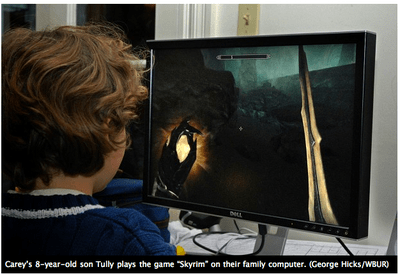Advertisement
Your Kid On Video Games: Creative Outlet Or More Like Crack Cocaine?
 Don't miss Carey's excellent radio piece this morning on how her son Tully's intense fascination with video games — some violent — might play out as he grows up. The piece also raises important questions about whether such testosterone-fueled games actually make kids more violent, or whether they help the children become more adventurous and creative, better problem solvers and critical thinkers.
Don't miss Carey's excellent radio piece this morning on how her son Tully's intense fascination with video games — some violent — might play out as he grows up. The piece also raises important questions about whether such testosterone-fueled games actually make kids more violent, or whether they help the children become more adventurous and creative, better problem solvers and critical thinkers.I encourage you to listen to the full piece, including current 20-something gamers speaking about the upside of playing video games as children. Here's a bit:
Tully started playing video games when he was still in preschool, first driving games because he was obsessed with cars, and then more elaborate games of exploration and battle.
His game-playing sparked the only major parenting conflict I’ve ever had with my husband, a software developer who’s worked on games and wanted to introduce Tully to their fun challenges. As a mother, I felt all my alarms going off: too much violence, too much screen time. At one point I even played the crack-cocaine card, as in: “You’re introducing our child to the media equivalent of crack cocaine!”
But then my attitude began to shift. Tully picked up reading early because he so wanted to decipher instructions on the screen. He started to spout historical facts. And he played one particular spelling game, “Bookworm,” that was undeniably violent but also clearly educational — and I loved it. You got a grid of letters, and the longer a word you spelled, the harder you got to clobber a mythical enemy.
So I’ve ended up… confused. In over 30 years — a full human generation — computer games have evolved from primitive ping-pong to rich, immersive worlds, some with more content in them than “War and Peace.” Many children now spend more time with games than with books or even TV. Critics warn that games may be addictive and lead to aggression. Supporters say that games may be the best educational tools ever. But what do we really know about their long-term effects?
I’m not the only one posing this question. Last week, President Obama asked Congress for $10 million to fund research into what causes gun violence, including possible links to violence in the media.
“Congress should fund research into the effects that violent video games have on young minds,” he said. “We don’t benefit from ignorance. We don’t benefit from not knowing the science of this epidemic.”
Surveys find that nearly all American children play some sort of digital games, whether it’s “Fruit Ninja” on a phone or “Halo 4” on an Xbox. They’re growing up at a time when games out-earn movies and television. “Clearly games are the 21st century’s most important form of media,” says MIT professor Eric Klopfer. So what does it mean to grow up gaming?
Here's what 8-year-old Tully has to say on the benefits of gaming:
This program aired on January 24, 2013. The audio for this program is not available.